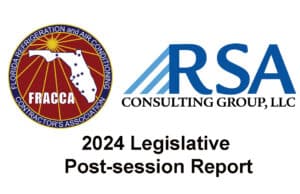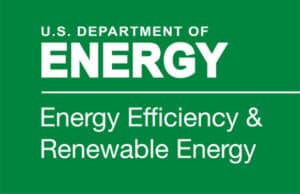The 2024 session of the Florida legislature passed two of FRACCA’s priority bills (HB 481 and HB 917) as identified by RSA Consulting Group’s Vice President of Government Relations and Community Affairs (and FRACCA’s lobbyist) Edward Briggs in his January 16, 2024 weekly wrap-up.
A third bill, HB 49, dealing with employment of minors, also passed and was approved by Governor DeSantis.
CS/HB 481 — Building Construction Regulations and System Warranties
by Civil Justice Subcommittee and Rep. Maggard (CS/SB 612 by Commerce and Tourism Committee and Senator Hooper)
The bill expands the kind of work that Class A and Class B air-conditioning contractors and mechanical contractors may undertake to include replacing, disconnecting, or reconnecting power wiring on the line side of a dedicated existing electrical disconnect switch on a single phase electrical system; and repairing or replacing power wiring, disconnects, breakers, or fuses for dedicated HVAC circuits with proper use of a circuit breaker lock.
The bill prohibits the conditioning of an HVAC system warranty on product registration and specifies that the full length of such a warranty’s coverage term begins on the date a licensed contractor installs the system. The bill also requires that an HVAC warranty or product registration card or form must specify that the card or form is for the product registration and that failure to complete and return the form does not diminish any warranty rights.
If approved by the Governor, or allowed to become law without the Governor’s signature, these provisions take effect July 1, 2024.
Vote: Senate 40-0; House 117-0
CS/CS/HB 917 – Career and Technical Education
by Education & Employment Committee; Choice & Innovation Subcommittee; and Rep. Snyder and others (CS/CS/CS/SB 460 by Fiscal Policy Committee; Appropriations Committee on Education; Education Pre-K -12 Committee; and Senators Simon and Perry)
The bill authorizes minors aged 16 or 17 to work in residential construction if the minor:
- Has earned his or her Occupational Safety and Health Administration (OSHA) 10 certification.
- Is under the direct supervision of a person 21 years of age or older with at least two years of related experience and his or her OSHA 10 certification.
- Is not working on any scaffolding, roof, superstructure, or ladder above six feet.
- Is not in violation of any OSHA rule or federal law related to minors in the workplace.
The bill provides a uniform standard for counties and municipalities to issue a license to a journeyworker.
The bill authorizes district school boards, as an alternative to the required high school career fair, to consult with local workforce development boards, advisory committees, and business groups to determine free or cost-effective methods to provide other career and industry networking opportunities, during the school day, for secondary students and exposure for elementary and secondary students to a representative variety of industries, businesses, and careers.
The bill authorizes a student who earns credit for one year of related technical instruction for a registered apprenticeship or preapprenticeship program to use such credit to satisfy specified high school graduation credit requirements.
The bill authorizes an exemption from the career education basic skills assessment to certain students with a private school diploma or home education affidavit.
The bill adds to the duties of the Office of Reimagining Education and Career Help (REACH Office) to study the status of career and technical education (CTE) in each school district within the state, and report findings by March 1, 2025. The REACH Office must also coordinate an annual statewide report on the supply and demand of nursing occupations. The bill also repeals the Florida Talent Development Council.
If approved by the Governor, or allowed to become law without the Governor’s signature, these provisions take effect July 1, 2024.
Vote: Senate 32-0; House 105-3
CS/CS/HB 49 — Employment
by Local Administration, Federal Affairs & Special Districts Subcommittee; Regulatory Reform & Economic Development Subcommittee; and Rep. Chaney and others (SB 1596 by Senator Burgess)
The bill (Chapter 2024-25, L.O.F.):
- Clarifies that minors 15 years old or younger may not work more than 15 hours in any one week, when school is in session.
- Provides an exception for minors 16 and 17 years to work for more than 8 hours in any one day when school is scheduled the following day and the day of work is a holiday or a Sunday.
- Provides that the cap of 30 hours per week when school is in session for minors 16 and 17 years old may be waived by a minor’s parent or custodian or by the school superintendent or designee.
- Allows minors 16 and 17 years old to work more than 6 consecutive days in any one week by lowering the age limitation to minors 15 years old or younger.
- Requires that minors 16 and 17 years old who work for 8 hours or more in any one day may not work for more than 4 hours continuously without an interval of at least 30 minutes for a meal period. The bill retains the limitation that minors 15 years old or younger may not work more than 4 hours continuously without an interval of at least 30 minutes for a meal period.
- Provides that the work restrictions do not apply to:
- Minors enrolled in any educational institution, not just public schools, who qualify on a hardship basis and receive a waiver on hours from the school superintendent.
- Minors 16 and 17 years old who are in a home education program or are enrolled in an approved virtual instruction program in which the minor is separated from the teacher by time only.
- Clarifies that the DBPR may grant a waiver of these restrictions.
- Clarifies that a violation by an employer of this section of law is punishable by fine and as a second degree misdemeanor as provided in s. 450.141, F.S.
These provisions were approved by the Governor and take effect July 1, 2024.
Vote: Senate 27-11; House 76-33
See the FRACCA RSA Post-Session Report HERE.








